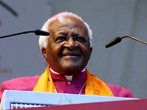Bishop Tutu: Using moral methods for moral ends

 cc Bishop Desmond Tutu, a book about four African women taken to Belgium to become commercial sex workers, a chance encounter with a ‘white Yoruba aunty’ on a train in London and Kenya’s revolt against tacky ‘traditional’ dance displays for tourists are among the topics talked about in this week’s round-up of the African blogosphere, compiled by Sokari Ekine.
cc Bishop Desmond Tutu, a book about four African women taken to Belgium to become commercial sex workers, a chance encounter with a ‘white Yoruba aunty’ on a train in London and Kenya’s revolt against tacky ‘traditional’ dance displays for tourists are among the topics talked about in this week’s round-up of the African blogosphere, compiled by Sokari Ekine.
http://www.pambazuka.org/images/articles/492/july28_01_tsmaluleke.gifTinyiko Sam Maluleke writes about the continent’s 2nd favourite elder, Bishop Desmond Tutu (Mandela being the first): Defender of human rights, storyteller, teacher, preacher, orator, debater – with a legendary sense of humour:
‘…inspired by his faith Tutu has always emphasized the need for the liberation struggle to be waged on moral principles, using moral methods for equally moral ends. For this reason he navigated the seemingly contradictory positions of supporting the liberation movements while condemning the use of violence in pursuit of liberation. Believing politics to be too important to be left to politicians, he has nevertheless eschewed becoming a politician himself.’
http://www.pambazuka.org/images/articles/492/july28_02_loft.gifAfrican Loft publishes an interview with Nigerian writer, Chika Unigwe. I had the pleasure in meeting Chikwa last year in London when she discussed and read from her most recent book, ‘Black Sister Street’. I only got as far as the first few pages as I gave my copy away to a friend, but it is on the top of my ‘to read’ list:
‘“Black Sisters’ Street” tells the story of four African women: Sisi, Efe, Ama and Joyce, who were taken to Belgium to work as commercial sex workers It talks about the transformation of these women in very realistic terms and paints an honest portrayal of these women who are considered as almost invisible in society.’
http://www.pambazuka.org/images/articles/492/july28_03_kayode.gifCanary Bird by Nigerian political activist, Kayode Ogunsami, is an excellent blog and I just wish he would update it more often. Here he writes about ‘A day with my white Yoruba aunty’ who he met on the train to Heathrow. The conversation started with the dreaded and tiresome ‘where are you originally from?’ Sigh!
‘I am originally from Yoruba Land in Africa until the British merged my ancestors with our African neighbours and made me Nigerian.’ To his surprise the white lady responded, ‘Oh you are Yoruba?’
‘My new “friend”, almost screaming, facing me, she stretched her hands forward, offering a hand shake. “I am Yoruba too, you are my brother. My name is Wendy, Wendy Omotayo.” That was when she switched from English to Yoruba - not my kind of Yoruba, but what we refer to as the “Ijinle” Yoruba.’
http://www.pambazuka.org/images/articles/492/july28_04_themoor.gifThe Moor Next Door posts a piece on ‘Post-coup politics’ in Africa:
‘Economic and social stability and smooth, generally legitimate and legal transfers of power are seen as deeply linked. The legality and the legitimacy of a regime are considered more important in powerful capitals than in the past. Coups, being illegal and disruptive, do not promote political stability or investor or donor confidence. The rule of law suffers from illegal transfers of power, which has implications for economic life because coups can cause elite paranoia and reallocations of state and private resources.’
Thinking about ‘post-coup’ politics, how about ‘post-dance-for-foreigners’ politics?
http://www.pambazuka.org/images/articles/492/july28_05_mental.gifMental Acrobatics comments on what is becoming increasingly tiresome habit of ‘a bunch of scantily clad dancers doing a [Zulu"> dance’. Mental is writing about the recent World Cup in South Africa but this tradition (I suspect it began in colonial times) is replicated across the continent. Fortunately a backlash is happening in Kenya which I hope will spread like wildfire across the continent:
‘In Kenya there is a growing cultural revolt against having “jumping Maasai in red shukas” as the only advertised symbol of Kenya culture. There has to be more to show than this, we cry. In a similar way how can these dancers been selected as the most prominent ambassadors of South Africa culture? You never get a second chance to make a first impression the saying goes. Are these dancers the first impression South Africa wants to give about its culture?’
Is it possible to develop technology applications in Africa which respond to the needs of Civil Society? Yes.
http://www.pambazuka.org/images/articles/492/july28_06_mshale.gifMashale writes about ‘Apps 4 Africa’, a contest that challenges software developers to respond to specific needs described by people in Kenya, Tanzania, Uganda and Rwanda:
‘Sponsored by Appfrica Labs of Kampala, the Innovation Hub (iHub) of Nairobi, the Social Development Network (SODNET) of Nairobi, and the U.S. State Department, the contest was launched July 1 at iHub, an innovation hub and community workspace for local technologists. The contest runs through August 31.’
http://www.pambazuka.org/images/articles/492/july28_07_bl.gifBlack Looks publishes a radio interview she did with African Perspectives out of Canada in which she discusses the dangers of a ‘single story’ of ‘African’ (how do we get away from conflating the whole continent?) sexualities, and gay imperialism and LGBTI rights in Africa.
BROUGHT TO YOU BY PAMBAZUKA NEWS
* Sokari Ekine blogs at Black Looks.
* Please send comments to [email protected] or comment online at Pambazuka News.
